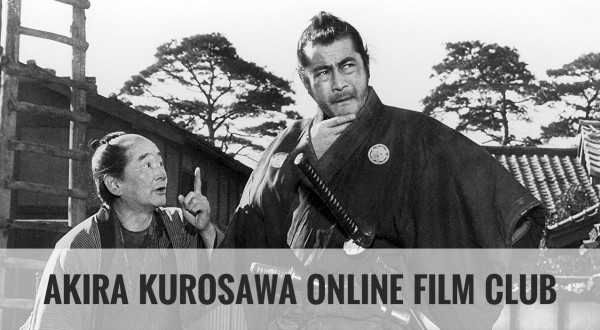
In 2008 we kicked off the Akira Kurosawa Online Film Club, our very own “movie of the month” group. Now, seven years, almost a hundred films and some four thousand posts later, we are about to reach the end of the film club’s second cycle. The question then becomes: what are we going to watch next?
The first cycle of the film club ran from 2008 to 2010 and covered the thirty films that Kurosawa directed during his career. The second cycle started in 2010 and again took us through Kurosawa’s thirty films, but this time in chronological order and with related films by other directors inserted between Kurosawa’s.
What should we do next? Which films would you like us to watch? What system should we follow? This is totally up to you guys, so whether you are a seasoned participant, a lurker or a newcomer, voice your opinion in the comments below.
If you have previously not taken part in the Akira Kurosawa film club, check out the film club page for more information about the concept. We look forward to hearing from you!






There are many ways to continue from here, but here’s one option that I have been thinking about.
During the last five years we have had quite a lot less discussion about the Kurosawa films than the non-Kurosawa films that we have watched. No doubt this is because many of us had already discussed Kurosawa’s films during the film club’s first cycle and found little to add during the second viewings. Yet, I feel that we cannot completely forget about Kurosawa’s films, not least because we have recently gained quite a number of new visitors and followers, and also because it’s the Akira Kurosawa film club.
I quite liked the second cycle’s system where we paired a Kurosawa film with another film which was in some way related to it. Could we perhaps build on that idea? This spring we saw four films in a row with related themes (Dreams, Black Rain, Rhapsody in August and Grave of the Fireflies) and I thought that it was really nice to explore a topic this way for a longer stretch of time.
So, how about picking a Kurosawa film and building a longer thematic schedule around it? Yojimbo, for instance, could be paired with a number of films including A Fistful of Dollars (which we saw already), Last Man Standing, The Glass Key, Red Harvest, Django, Zatoichi Meets Yojimbo, Miller’s Crossing, Youth of the Beast, the animated series Kaze no Yojimbo, or indeed many others. We wouldn’t need to (and probably shouldn’t) watch all of them, but we could choose, say, 4-6 films and schedule to watch one film / month. This way, we would spend about half a year with a single theme.
As for the Kurosawa film, we could either watch it as one of the monthly films, or assume that the viewer is familiar with it. In the latter case, the Kurosawa film would be a “film of the month” for the whole period, together with the non-Kurosawa film which changes monthly.
Films could be grouped in a number of ways. Thematically (as we sort of did this spring), historically (as in the above Yojimbo example where all films share a plot or characters), by actor (e.g. non-Kurosawa films with Toshiro Mifune) or by another Kurosawa related feature (e.g. works by directors who have been called the “new Kurosawa”). It’s really up to us.
This would of course require us to come up with these groupings a couple of times a year, but I think that’s doable.
Anyway, it’s just one option. I am certainly open for continuing with either of the earlier systems, or with any other clever arrangement that you guys can come up with.